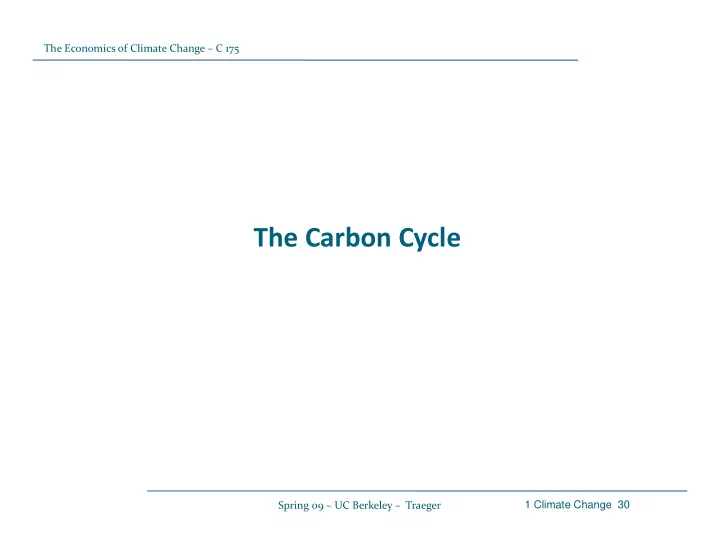

The Economics of Climate Change – C 175 The Carbon Cycle The Carbon Cycle Spring 09 – UC Berkeley – Traeger 1 Climate Change 30
The Economics of Climate Change – C 175 Antropogenic Carbon Emissions and Atmospheric Accumulation Flows! Source: Houghton, R.A. (2007), Balancing the Global Carbon Budget, Annu. Rev. Earth Planet. Sci. 35:313–47. Spring 09 – UC Berkeley – Traeger 1 Climate Change 31
The Economics of Climate Change – C 175 Where is all the Carbon? (2005) Athmosphere: Stocks! CO2 : 805 Gt Methane: 1.7 Gt Oceans : 38 000 Gt Surface, contact with atmosphere: 700 ‐ 1000 Terrestial Systems: terrestrial vegetation : 540 560 Gt terrestrial vegetation : 540 ‐ 560 Gt organic matter in soils : 1 500 – 2 000 Gt (in the top meter ) Note: 50% of dry (water removed) organic matter is carbon 5 y ( ) g Fossil Fuels : Recoverable reserves of coal, oil, and gas: 5 000–10 000 Gt Spring 09 – UC Berkeley – Traeger 1 Climate Change 32
The Economics of Climate Change – C 175 Carbon Stocks & Flows Units: 1 Pg =10 15 g = 1 Gt =Billion tons Houghton, R.A. (2007), Balancing the Global Carbon Budget, Annu. Rev. Earth Planet. Sci. 35:313–47. Spring 09 – UC Berkeley – Traeger 1 Climate Change 33
The Economics of Climate Change – C 175 Budgeting the Antropogenic Changes Spring 09 – UC Berkeley – Traeger 1 Climate Change 34
The Economics of Climate Change – C 175 How to find the ‘Missing Carbon’? Last Friday (01/23/09) Japan’s Aerospace Exploration Agency lauched “ IBUKI” Last Friday (01/23/09) Japans Aerospace Exploration Agency lauched IBUKI …not to search for little C’s in outer space, but to… Spring 09 – UC Berkeley – Traeger 1 Climate Change 35
The Economics of Climate Change – C 175 monitor the change in infrared radiation caused by the presence of CO 2 “IBUKI”=GOSAT= Greenhouse Gases Observing Satellite Next month (02/23/09) NASA launches OCO from the Vandenberg Air Force Base in California (~Santa Barbara) As we learned during the course of the lecture sleeps now in Antarcic Waters... Spring 09 – UC Berkeley – Traeger 1 Climate Change 36
The Economics of Climate Change – C 175 Hope to get more precise maps of sinks and sources The Carbon Tracker Project Map depicts model based interpolation of changes in The Carbon Tracker Project. Map depicts model based interpolation of changes in Cabon flux, watch the date! Spring 09 – UC Berkeley – Traeger 1 Climate Change 37
The Economics of Climate Change – C 175 Hope to get high resolution maps of sinks and sources The Carbon Tracker Project, Northern summer. http://www.esrl.noaa.gov/gmd/ccgg/carbontracker/fluxmaps.php?type=global#imagetable Spring 09 – UC Berkeley – Traeger 1 Climate Change 38
The Economics of Climate Change – C 175 Seasonal pattern of CO 2 concentrations: Source: Dr. Pieter Tans, NOAA/ESRL (www.esrl.noaa.gov/gmd/ccgg/trends/) Spring 09 – UC Berkeley – Traeger 1 Climate Change 39
The Economics of Climate Change – C 175 Finding the missing carbon Why are we interested in these details? Natural Sinks and Sources can change over time, in particular, in response to climate change. p g To predict these changes we need to find and understand the sinks, sources, and mechanisms at work. Spring 09 – UC Berkeley – Traeger 1 Climate Change 40
The Economics of Climate Change – C 175 Carbon Cycle & Feedback Effects Source: IPCC (2007), WG1. Spring 09 – UC Berkeley – Traeger 1 Climate Change 41
The Economics of Climate Change – C 175 The current terrestrial carbon sink represents a subsidy that has kept the airborne fraction of total CO2 emissions between 40% and 50% for at least the past five decades at least the past five decades. Most projections of future climate have been based on the assumption that the current terrestrial sink will not only continue but will grow in proportion to concentrations of CO2. ti t t ti f CO Recent findings and feedback effects challenge this assumption For more: Houghton, R.A. (2007), Balancing the Global Carbon Budget, g , ( 7), g g , Annual Review of Earth and Planetary Science 35:313–47. Spring 09 – UC Berkeley – Traeger 1 Climate Change 42
Recommend
More recommend